Conservatives and the Steady State Economy: A Natural Fit
by Brian Czech
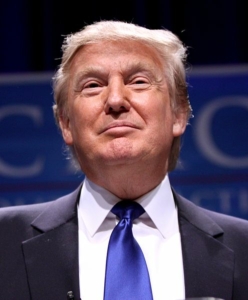
Donald Trump: true conservative? (CC BY-SA 3.0, Gage Skidmore)
If you call yourself a “conservative” these days, what does that tell us? Or, what is it supposed to tell us? Does it mean you’re a Republican, a Tory, or a member of the largest party in the democratic world, the Bharatiya Janata Party? Must you be a particular brand of partisan—maybe a MAGA Republican or a Modi भक्त—to wear the conservative hat?
What about your faith? Are you automatically a Christian in the Western world, a Hindu in South Asia, or a Muslim in the “Stan” countries? Do you wear the uttarasanga in Thailand or the kippah in Israel? How do your conservative beliefs translate into economic policy?
In the West, at least, “conservative” seems to imply quite a pro-growth position. Is economic growth a natural fit under the conservative umbrella, or is it more of a “neoconservative” add-on?
The very phrases “traditional conservative” (which seems a bit redundant) and “neoconservative” would suggest that conservative principles—certain ones at least—are mutable. I’ll take that as my cue to argue for the steady state economy as a central pillar of 21st century conservatism.
(Root) Words Matter
If you were a smoker and trying to kick the habit, you’d find it odd if someone offered you a cigarette as a “curative.” You might wonder what they’d been smoking, because the suffix “ative” is supposed to carry some meaning; in particular, “of, relating to, or connected with.” Yes, a cigarette might be “related to” your challenge, but calling it a “curative” is misleading at best, and cruel at worst.

Not a “curative.” (CC0 1.0)
Similarly, when used in an adjective, “ative” means “tending to.” If you are an ameliorative sort, you tend to ameliorate, not exacerbate. (You tend toward curative solutions, coincidentally.)
Furthermore, the mixing of “ative” nouns and adjectives is common, even in the same sentence. A cooperative, for example, may or may not be truly cooperative. A collaborative may or may not be collaborative. And—as we know so well—a representative may or may not be representative.
We might ask ourselves, what good is an unrepresentative representative, an uncollaborative collaborative, or an uncooperative cooperative? Why do they call themselves things they are not? Why do they lie? Do they know they lie?
If You Don’t Conserve, You’re No Conservative
When it comes to “conservative,” it requires only a simple extraction of the “ative” suffix to be left with the root word “conserve.” That, then, should tell us precisely what a conservative is.
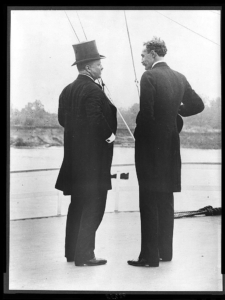
Theodore Roosevelt and Gifford Pinchot: traditional conservatives. (Public Domain Mark)
According to the Oxford English Dictionary, “conserve” means to “protect (something, especially an environmentally or culturally important place or thing) from harm or destruction.” To clarify, it was not yours truly who inserted in parentheses the emphasis on “environmentally or culturally important,” but rather the staid authorities at Oxford English Dictionary. They provided but one example of conserve: “the funds raised will help conserve endangered meadowlands.”
Surely, then, environmental protection would be the first and foremost consideration in labeling a conservative, right? If someone protects the environment, then they’re a conservative, or at least they have taken the first and biggest step toward being one. If they don’t protect the environment, they must be something else.
The natural linkage between being a conservative and protecting the environment is corroborated and solidified by the fact that the closest synonym to “protecting the environment” is simply “conservation.” There’s that root word “conserve” again. So, unless you want to call a cigarette a curative, you’re going to have to conserve and protect the environment. Otherwise, you’re no conservative.
Environmental and Cultural Conservatism
An industrial polluter or otherwise environmentally rapacious “conservative” might argue, based on the Oxford English Dictionary, that they still qualify for the title by protecting a “culturally important place or thing.” I’m not buying it, though, are you? If someone is going to label their very self with an “ative” noun, they better be “of, relating to, or connected with” the root of the noun. They shouldn’t be able to pick and choose incomplete elements of a meaning to claim the full title, especially if they’re leaving out the single most relevant meaning of the root word. That would be insincere and fraudulent.

Forks, Washington: a conservative culture protected via conservation. (CC BY-NC-ND 2.0, Amayzun)
Now if you’re the industrial polluter, you might be able to legitimately elaborate, using the adverb “culturally” as a disclaimer, “I’m culturally conservative.” However, merely by specifying a particular aspect in which you lean conservative implies that you are not, in fact, a conservative. You’re no more of a conservative than Al Gore. If anything, Gore would qualify for the title before you, because he can lay claim to the top shelf in the conservative pantry, as an environmental protector par excellence.
But there’s a deeper reason you can’t be a real conservative without being for conservation. The very culture you claim to value rests on a place-based environmental identity. If you’re trying to protect a fishing culture—say cod fishing in New England, salmon fishing in Alaska, or shrimping in Louisiana—you better start by protecting the fishery. All the boats and poles and nets in the state won’t protect your fishing culture if there’s nothing to catch!
If you’re trying to protect a logging culture, you better protect the forests. Ranching culture? Protect the rangelands. Dairy culture? Protect the farmlands. I do believe we’ve covered a substantial area of the USA with these cultures alone!
Roughly half the senators in Congress are supposed to be representing these nature-based cultures, more or less predominantly. All it takes is a basic understanding of American geography to arrive at such an estimate, starting with the eleven western states, moving into the prairie states of the Midwest, and adding in states of predominantly natural character (Alaska and Maine, for example).
In the House, about 42 percent (184/435) of representatives should be truly conservative—conserving and protecting the environment—most notably the 70 serving “pure rural” districts. That’s assuming these are truly representative representatives, pursuant to our “ative” standards.
Protection from What?
And what are we true conservatives protecting the forests, fisheries, rangelands, and farmlands from? It’s not the U.S. Forest Service, Fish and Wildlife Service, Bureau of Land Management, or Natural Resources Conservation Service we need to worry about. Forget about the fact that they’re part of the government, which Dark Money wants to shrink for regulation-shirking purposes. These natural resource agencies are basically on our side, protecting the natural environments that support our natural cultures.

Mining culture: expiration date included. (CC0 1.0)
The real threat to the true conservative is the bulldozer; the proverbial and sometimes literal bulldozer of urbanization, industrial development, and infrastructure. The proliferation of the economy, in other words.
Cultural conservatism is harder to come by when it’s based on non-renewable resources. Drilling and mining cultures have an expiration date. The best way to protect a non-renewable culture would be to slow the rate of extraction (which would have the additional benefit of slowing the bulldozer). Kids, grandkids…maybe even seven generations might have a chance to experience the lifestyle. Ultimately, however, it’s hard to square a drilling or mining culture with true conservatism.
Of course, culture isn’t all about work. Two of the most cherished, traditionally conservative pursuits are hunting and fishing. In many cases the threats to hunting and fishing are concurrent with the threats to forests, rangelands and (too obviously perhaps) fisheries. Certainly while farmland is lost to “development,” a lot of hunting and fishing goes with it.
Economic Growth and Conservatism: An Unholy Alliance
How did political conservatism get hitched to an ever-growing GDP to begin with? Perhaps in the pursuit of liberty, aka freedom, including economic freedom or “laissez faire.” Yet the very principle of liberty causes immediate problems for the conservative, and it should, because the Latin root “liber” (free) is precisely the same in the words “liberty” and “liberal.” The latter, of course, is naturally opposed by conservatives (and positively abhorred by MAGA Republicans).
Perhaps conservatives overcome this fundamental contradiction—being for liberty while being against liberals—by picking and choosing from numerous connotations of “liberty.” Merriam-Webster offers four primary and no fewer than eleven secondary meanings of liberty. Two meanings would seem to support the notion of perpetual GDP growth: “an action going beyond normal limits” and “freedom from physical restraint.”
Notions of perpetual growth certainly entail “going beyond normal limits.” “Normal” in this case is synonymous with natural, including natural physical restraint (such as a finite planet). Perpetual GDP growth, then, would be a supernatural phenomenon, entirely unrooted from nature and reality. That hardly seems like a traditionally conservative approach!
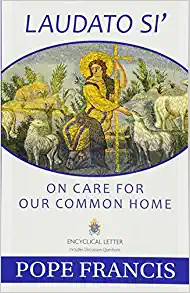
Laudato si’: book of (conservative) revelation.
Irving Kristol provided a different explanation in his article, “The Neoconservative Persuasion,” in which he contrasted neoconservatism with traditional conservatism. “Neocons are familiar with intellectual history,” he wrote, “and aware that it is only in the last two centuries that democracy has become a respectable option among political thinkers. In earlier times, democracy meant an inherently turbulent political regime, with the ‘have-nots’ and the ‘haves’ engaged in a perpetual and utterly destructive class struggle. It was only the prospect of economic growth in which everyone prospered, if not equally or simultaneously, that gave modern democracies their legitimacy and durability.” Thus the “steady focus on economic growth.”
To the degree that Kristol was correct, today’s pro-growth Republicans should be labeled “neoconservatives” to distinguish them from the brand of conservatism that is traditional and grounded in the vernacular (in particular with the focus on the root word “conserve”).
Whatever its origins, the alliance between conservative ideology and economic growth conflicts not only with laws of nature, but with the Christian virtues outlined by Pope Francis in the Laudato si’, On Care for Our Common Home, the encyclical focused on environmental protection. It should not be surprising to find the Vatican, a bastion of conservatism, taking the truly conservative approach of environmental protection and nature conservation. What is surprising is “conservative” Catholic leadership undermining the Laudato si’ in the USA and in Australia.
Conservatives and Liberals: Unconsciously Seeking the Steady State
The purpose of this article isn’t to coronate liberals as superior to conservatives in the USA or elsewhere, even though liberals are thought to be more concerned with and oriented toward environmental protection. This distinction has long been the case and has gotten more pronounced with climate change. Unfortunately, liberals have their own problem—a very big one—with doing what they say.
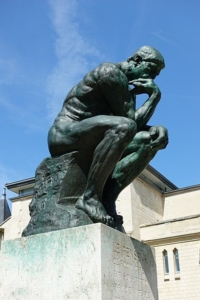
Let’s think about what “conservative” entails. (CC BY-SA 4.0., CrisNYCa)
While conservatives have lost touch with the root word “conserve,” liberals seem to have lost touch with the meaning of “environmental protection.” They’ve forgotten, for example, how the 93rd Congress found and declared that species “have been rendered extinct as a consequence of economic growth and development.” They’ve become even more notorious than conservatives for the win-win rhetoric that “there is no conflict between growing the economy and protecting the environment.”
Steady staters, then (who presumably tend toward political independence) would be wise to court both sides of the political aisle, as each has latent inclinations toward a steady state economy. Liberals have the inside track, apparently, on “environmental protection” as a political plank. Once they’ve come to recognize the fundamental conflict between economic growth and environmental protection, they can prove themselves by embracing the steady state economy.
Yet this article is focused on “conservatives,” because the very title of “conservative” is just too big of a lie if it’s not hitched to conservation. If you’re not for conservation, you’re not a true conservative. In other words, a true conservative would be a real conservationist, and therefore a steady stater.
We might even conclude that conservatism is a steady state economy.
 Brian Czech is CASSE’s Executive Director.
Brian Czech is CASSE’s Executive Director.





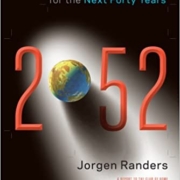


Excellent piece, Brian. I’ve called myself a Green Conservative for decades. I’m disappointed that you omitted overpopulation. So does the Catholic Church!
It’s hard to hit every topic in each article, Steven. We write often about population at the Herald, though. In fact, my last article was about population, with an emphasis on the steady-state approach to immigration: https://steadystate.org/a-steady-state-approach-to-immigration/ .
I have been trying to make Brian’s arguments (not as eloquently as he has done) with conservative groups: The article is right: today’s conservatves are often neo-cons, and notice how neo-cons can float seemlessly from one major party to the other. I’ve also proposed a steady state argument to purveyors of green new deals that are rooted in changing the energy in order to continue the same level of onsumption. Tough sell. In the end, I believe that steady state can relate to what Serge Latouche calls “frugal abundance”. Conservatives who are not aligned wth the Heritage or Cato Foundations should relate to that. They like the word “frugal”. Great thinkers like Thoreau, Bertrand Russell and Ivan Illlich all wrote that by consuming less, we would be able to work less, and thus have more time to enjoy life.
I think an article on “frugal abundance” would be perfect for the Herald, Mark. The phrase is linguistically challenged, though (as a condition can’t act). Maybe you can coin a new iteration?
So true. This reminds me of how Scandinavian “small c” conservatives tend to view the world (I have Finnish in-laws). They tend to view the world with an eye toward, what is perhaps the worst that can happen? They don’t want to depend on everything working just fine, they want to be careful — I would say “conservative” — in their plans.
Ergo, have a little more preserved food than you think you need, just in case of calamity. Ensure fresh water supplies for the community are more than adequate, just in case. If fossil fuels are a problem, we’d better start switching away now, just in case our estimates of the problem are underestimates.
In that Scandinavian sense, I’m rather conservative myself. Hope for the best, but expect and prepare for the worst, curb one’s appetites.
Yet another great idea for an article!
1. There is a long conservative tradition that has been sceptical and even hostile to capitalist modernity which is a liberal and more latterly social democratic project of the Enlightenment. The late Roger Scruton RIP was one such exemplar. Wendell Berry, GK Chesterton, Hilaire Belloc also come to mind. What you are calling ‘conservative’ is largely Liberal or Neo-liberal. And in fact there is now a growing split on both sides of the pond – with Neo-cons (the Koch foundation not least) in the same camp as most of the progressive left – in favour of open borders, hyper-individualism, woke identity politics and a de facto acceptance of consumerism and growth. If you want a welfare state, you’re kind of committed to growth. If you support open borders, you are committed to a different kind of growth – which is at the same time, perhaps confusingly, incompatible with social democracy. The Democratic and Labour Parties are very confused. The Greens even more so. If you want a society of narcissistic individuals unconstrained by either society or nature, then any kind of limit to growth must be an anathema. The Canadian Green Party has just exploded itself over a disagreement about pronouns.
If you are serious about any kind of limits-based economy, you MUST be a conservative and a traditionalist for the simple reason that the traditional institutions of marriage, family, community and locally managed common pool resources – a domain you could call LIVELIHOOD – must expand to balance a contracting MARKET but also a contracting STATE. Liberals, lefties, progressives are a million miles from this. They share 100% with the Neo-cons and the Neo-liberals a vision of a globally integrated hyper mobile society of individuals managed by increasingly authoritarian central states. Whatever else it is, woke politics is globalist and growth dependent. It just seems strange to take pot shots at conservatism whilst ignoring the elephant in the room. Every green event now starts with a discussion about pronouns. That is unavoidably a globalist, individualist, statist and market-centric agenda….It is hostile to the traditional family and to the kind of localism and subsidiarity required by any realistic vision of the steady state. The only version of a steady state economy that makes any sense at all – which doesn’t mean it is without problems – would start with something like the social-catholic tradition of distributism. Family would be front and centre. Immigration controls would be a central discussion (balancing equity and justice with the need for social cohesion, a contracting market and the limits of state action)
I live in a country where the state plays a major role: France. We have a humane, universal health care system that would not exist if the state were not the single payer for more than 70% of health care. Result: no one has ever needed a go-fund-me campaign to raise money for a health catastrophe and this helps traditional families to thrive. France spends significantly less that the USA on health care, and devotes much to preventive care, which means there is no financial growth incentive for medical interventions. This is much closer to steady state because health care is not a growth industry. For most of the 22 years I’ve been here, we’ve had conservative governments. My point is that there is room for healthy debate about the role of the state in a steady state economy,
Steve made some interesting points, but was overly sweeping. For example, I’m not sure how a discussion about pronouns (as much as I’d personally avoid it) is “unavoidably a globalist, individualist, statist and market-centric agenda.”
Your point, Mark, is honed in and more compelling, I think. It seems pretty clear that the state has a significant role to play in steady statesmanship.
Hmm I don’t get it. France is nowhere near a steady state. The putative green dirigiste state is surely the epitome of ecological modernization. And if the EU doesn’t kickstart economic growth, it will fall apart – chaotically. The Ukraine war is bringing this prospect front and centre. Until the 1970s, greens – Tolstoy, Illich, Berry, Gandhi, Kohr, Schumacher – all started from the assumption of family-based, livelihood-based economics rooted in and expressed through a transcendent moral order. The pronouns thing IS central because it is the end point of a secular, hyper-individualist understanding of the self as separate from any kind of transcendent morality – that goes back to Rousseau. The individualized, secularized, sexual self that has emerged on the back of the sex/gender revolution can’t be sustained in the absence of a hyper mobile consumer society; nor in the absence of a strong growth-driven state that is able to play backstop, play father, provide surgeons, subsidize the medical technologies…and take over the role of family. That commitment to individual mobility and psycho-self-creation …the idea of an expressive Cartesian soul, separate from the body…is a denial of natural limits and of a restraining transcendent moral order, every bit as hubristic as the kind of economic denial of ecological limits with which steady-staters are concerned. And the two are linked – intrinsically. We can’t challenge the latter, without confronting the former – and that requires a rejection of the sex/gender revolution; a rejection of the ideology of the individual without limits; a recognition of the central role of the family in forming individuals and structuring reciprocating communities. It also requires that we re-embrace the unavoidable reality of a transcendent moral order. Global consumer society and the society of transactional. mobile sexual individuals selves – this is what Rieff called a death culture/anti-culture.
The very best starting place I can think of for a green conservatism and for any kind of functional steady state society would be Christopher Alexander’s Pattern Language https://www.amazon.ca/Phenomenon-Life-Nature-Building-Universe/dp/0972652914/ref=sr_1_10?crid=2ARN7H5EAJRMW&keywords=a+pattern+language+christopher+alexander&qid=1663872459&sprefix=Christopher+Alexander%2Caps%2C965&sr=8-10
Whether we are dealing with those who allege themselves politically CONSERVATIVE (Republican, Tory or Australian Liberal Party) or those who call themselves LIBERAL & Progresive (Australia’s Labor Party, Britain’s Labour and to a lesser extent, the Democrats) it is not the semantics of the word CONSERVATIVE that exercises their ideology or actions. The maintenance of the fraudulent notion that we can eternally grow an economy (or anything else) in an environmental wasteland is what they share. What both political persuasions (call them right and left if you wish) really want to conserve, of course, is the exercise of power (via different roads).
I do not think the Australian Greens (of which i am a member) shares in this common delusion re the sanctity of economic growth. They are ‘green’ conservatives, intent on restoring a paramount environmental mindset, not ‘woke’
or ‘lefty’ (terms used by recidivist, neoliberal, neo-con interests to disparage & dialect debate).
You’re probably right, Stephen–largely so–yet I think we should challenge “conservatives” to reflect on their label and history.
Excellent, Brian. As I was once an active conservative decades ago (but no longer), I’ll add just a bit.
Russell Kirk was the Father (or perhaps Godfather) of the modern-day conservative movement. His brand of conservatism, which pretty much fits in with your description of what conservatism should be, was totally co-opted by Kristol’s neoconservative movement. There are only neoconservatives today (in positions of importance), and except for a few hot-button issues, they aren’t much different from neoliberals. [Neoliberalism is not “new” or “liberal”.] Both support privatization, austerity for Main Street, deregulation to the max, corporate globalization, infinite growth, and military adventurism.
Most Main Street “conservatives” today seem to be completely unaware of the fact that original Russell Kirk conservatism has been replaced by Kristol’s neoconservatism. I’m even convinced that many so-called conservatives are unaware of Russell Kirk, and probably haven’t even read his iconic work, “The Conservative Mind”, published in 1953.
In a very real sense, the overwhelmingly dominant political and economic philosophy today is neoliberalism. It rules the roost in almost all democratic countries. No other label comes close. Most of the world recognizes that. Not so in the USA. Main Street here appears to be oblivious to the importance and dominance of neoliberalism. Such is probably due to rampant propaganda and the egregious corporate, mainstream media. C’est la vie, eh?
Happy Trails
Excellent point Scott, and I hope you’ll elaborate upon it in an article for the Herald!
Briefly, political conservatives seem to be most interested I conserving their personal fortunes and incomes.
I’m not sure you know many conservatives? Try reading Joseph Pearce in the Imaginative Conservative online…he wrote the sequel to Schumacher’s Small is Beautiful (Small is Still beautiful). All traditional catholics are conservative…and most would put the transcendent moral order rooted in family way above wealth in their order of priorities. Nanci Pelosi on the other hand has increased her fortune by $140m since 2008 – so I read in the news to day. The fact of the matter is that ALL Dems, Labour and many greens are in bed with Neo-liberals and Neo-cons, in so far as they seek open borders, the free mobility of capital. Woke identity politics is a cover for what is a essentially a Neo-liberal growth/consumerism. It is those awful MAGA nationalists who are effectively more antagonist to Neo-liberal globalists …Doesn’t mean that they are green or truly conservative….But it does mean that the left-right thing is no longer a very good guide to the political landscape. I would take Rod Dreher and Joseph Pearce over anyone in the Canadian Green Party which is currently committed to open borders and has just torn itself apart over some crazily arcane scandal about pronouns and misgendering. The very sanest basis for conservatism is Rerum Novarum and the social catholic programme of subsidiarity/family-based, localist economics. This was what informed Schumacher’s Small is Beautiful. It was good then and good now. https://theimaginativeconservative.org/2013/02/small-is-beautiful-faithful-vision-of-e.html